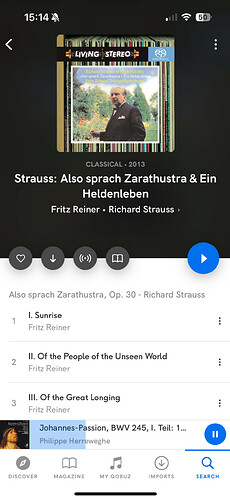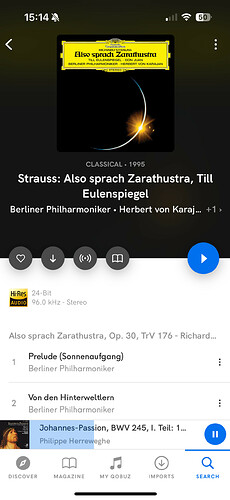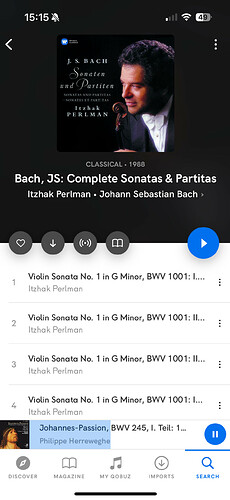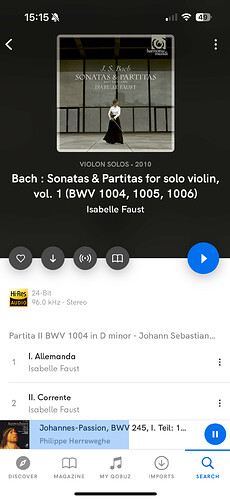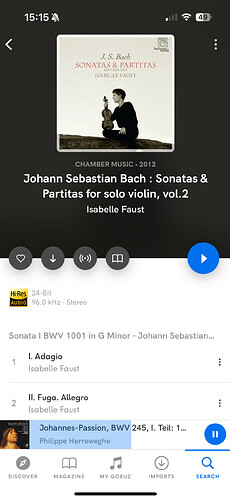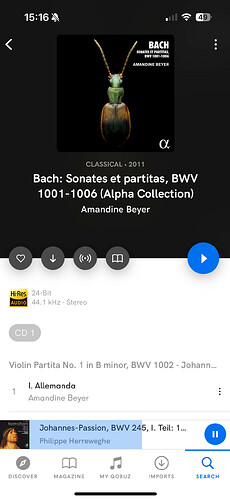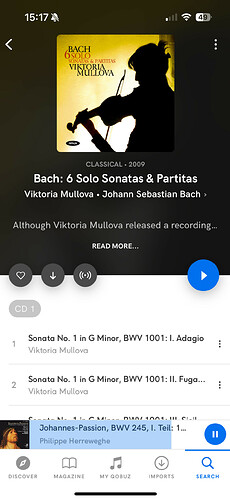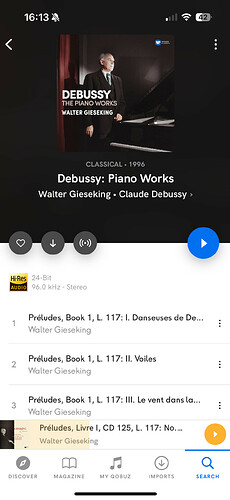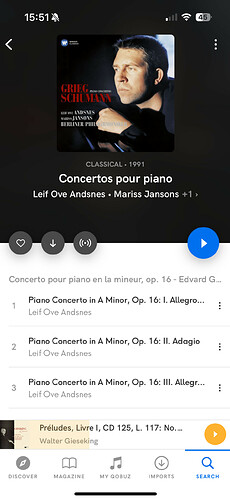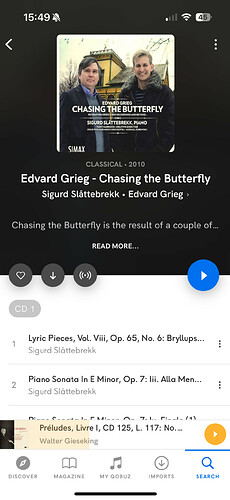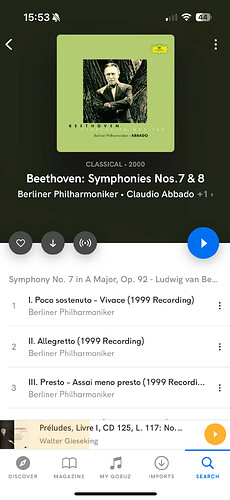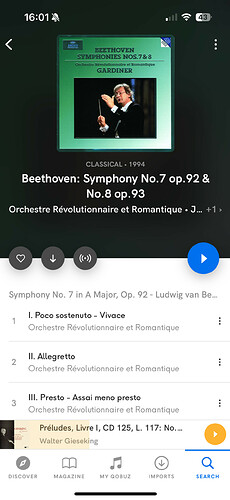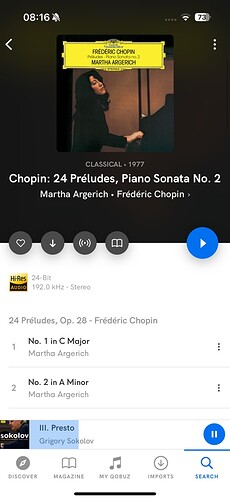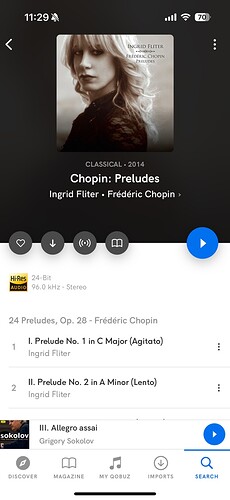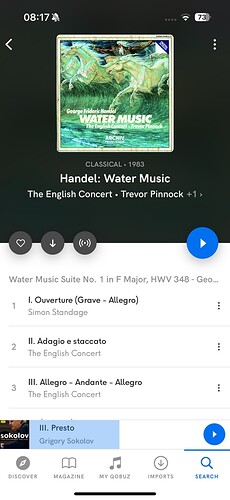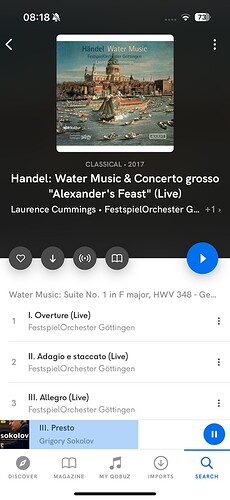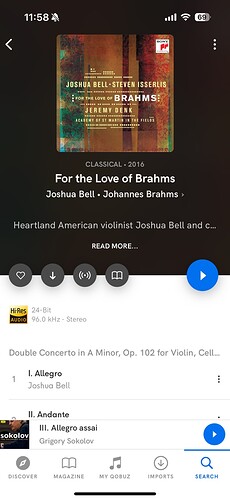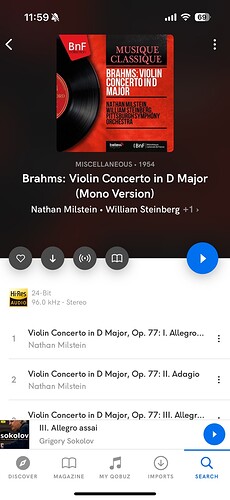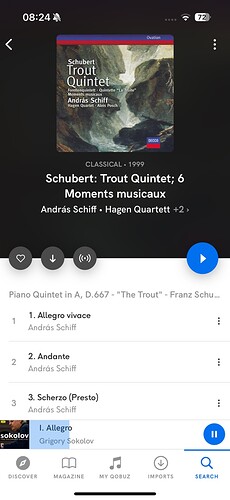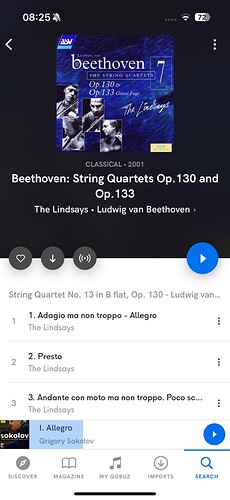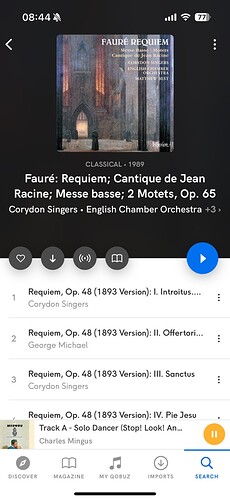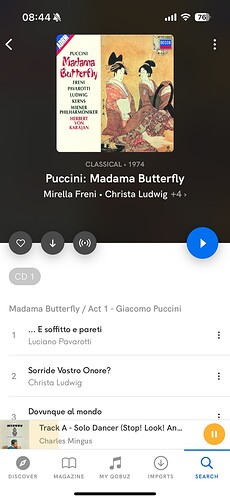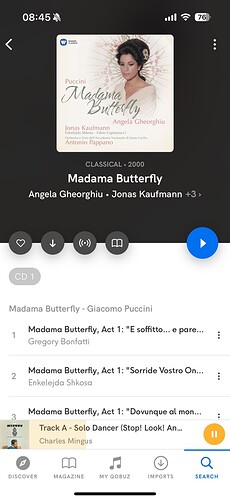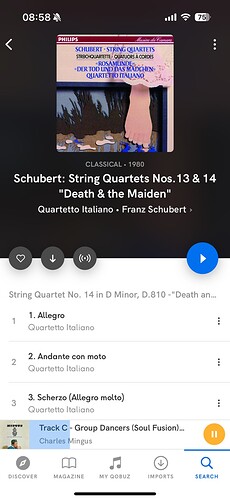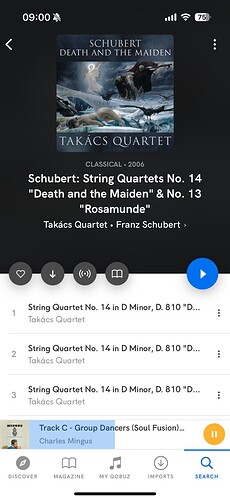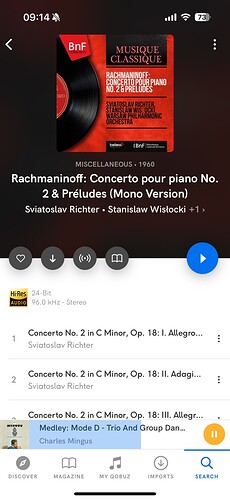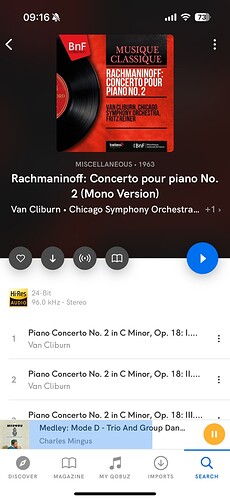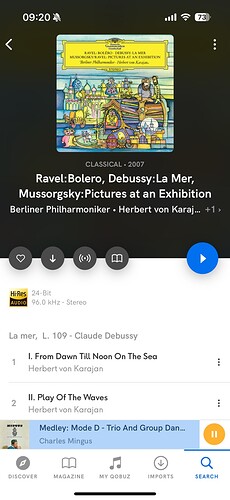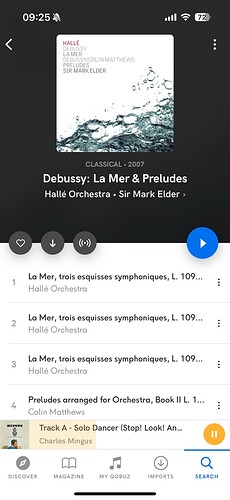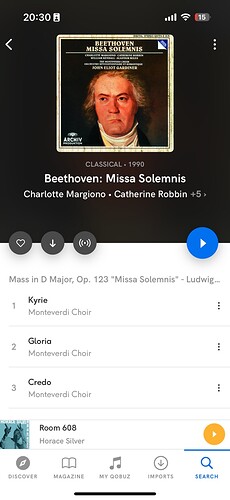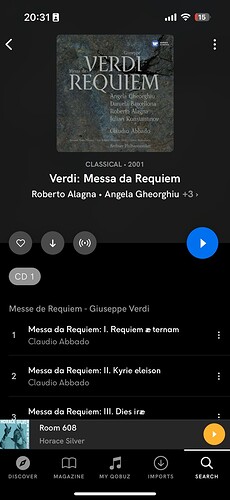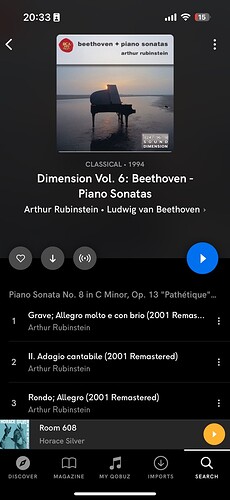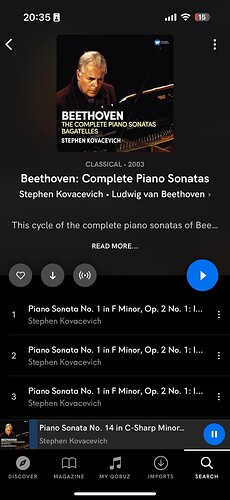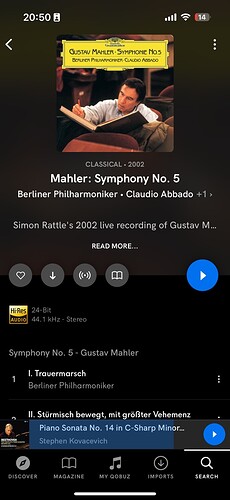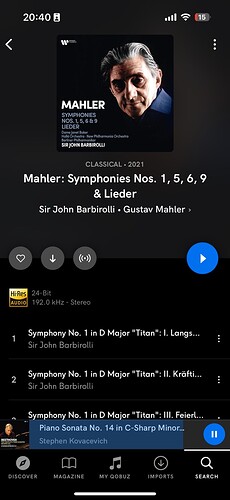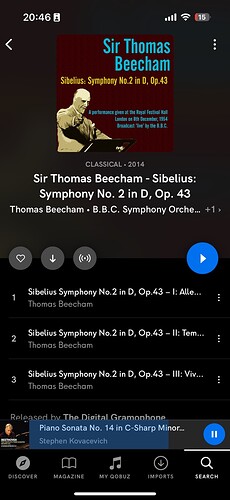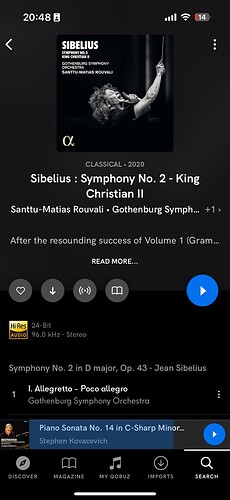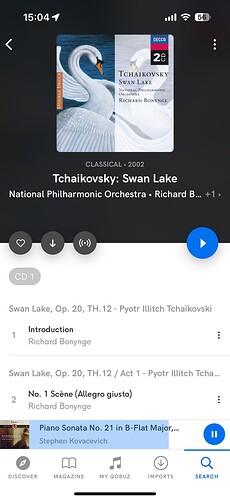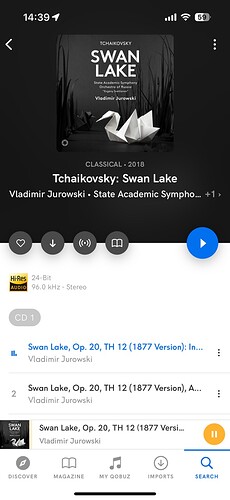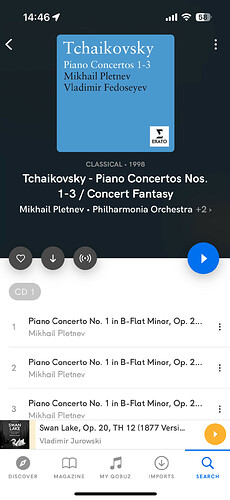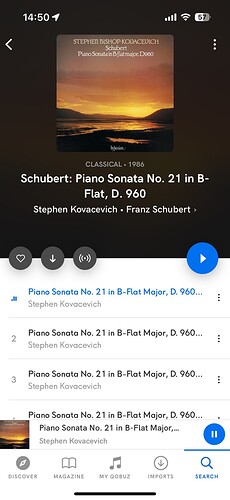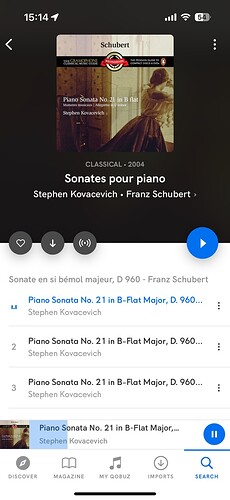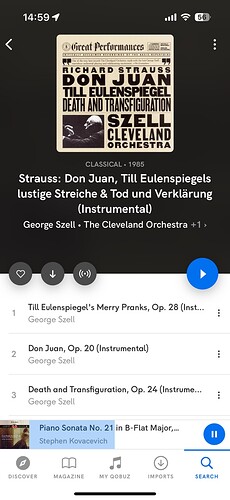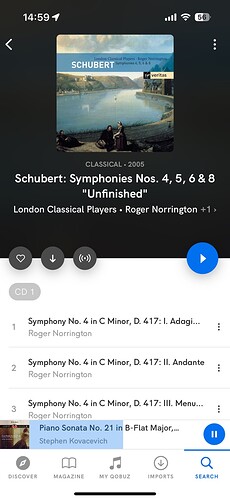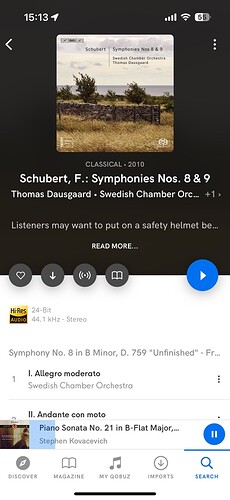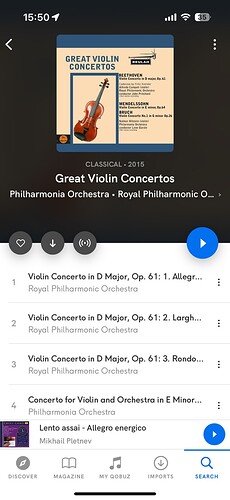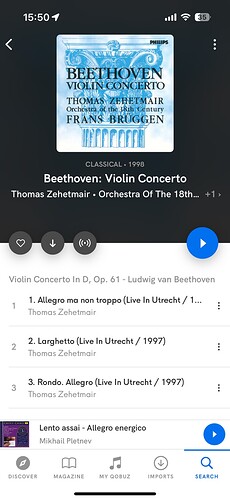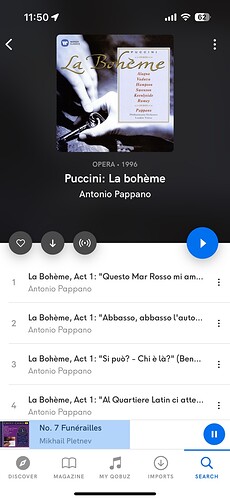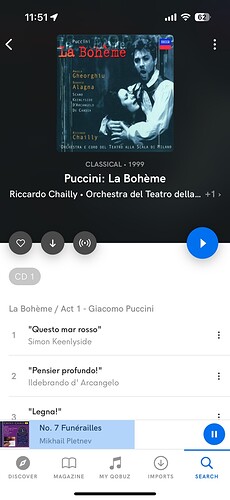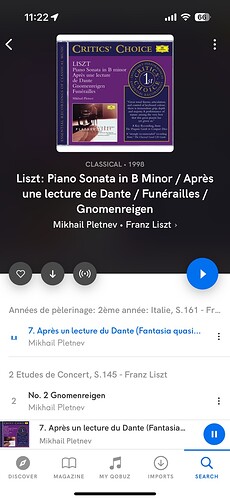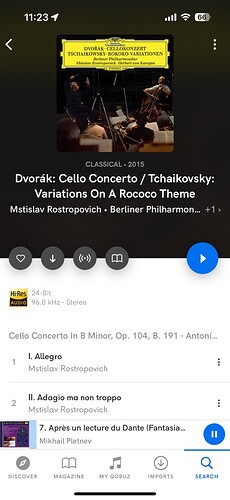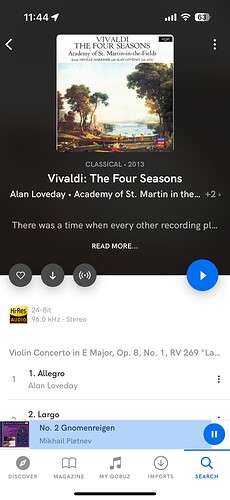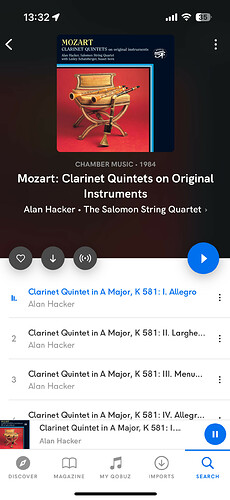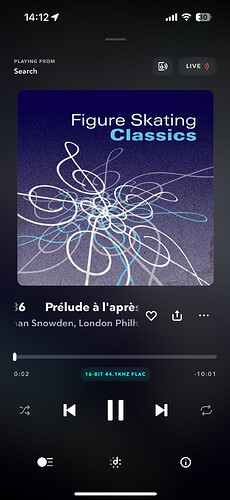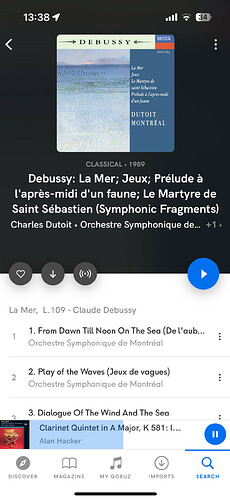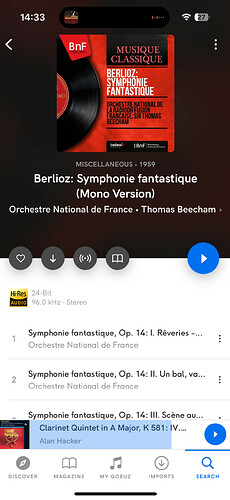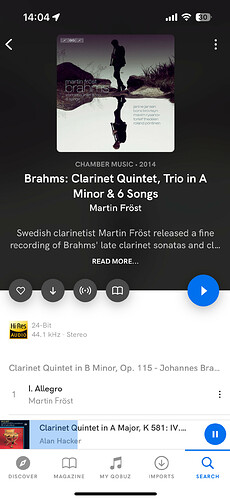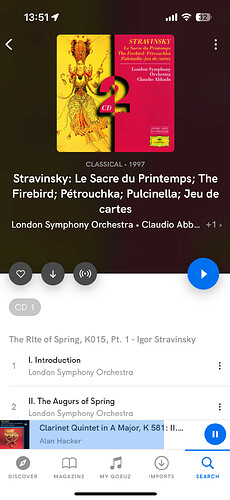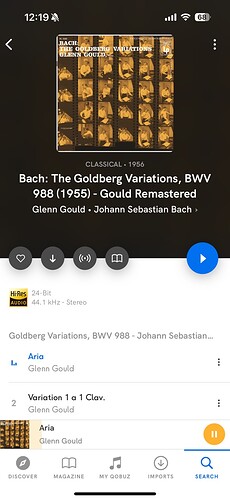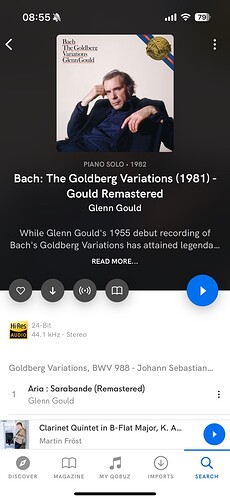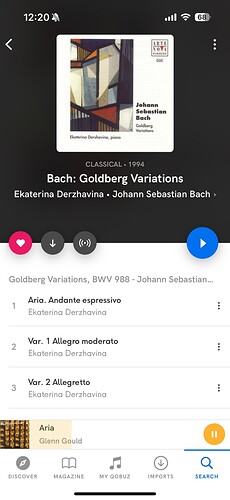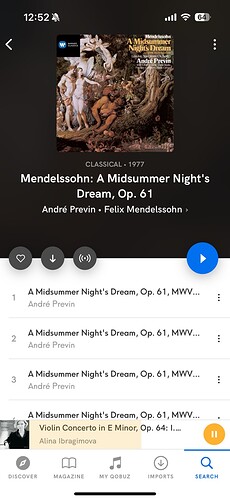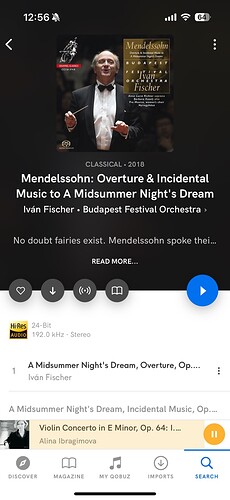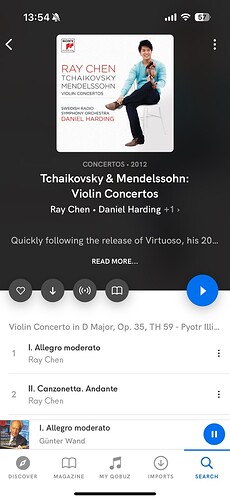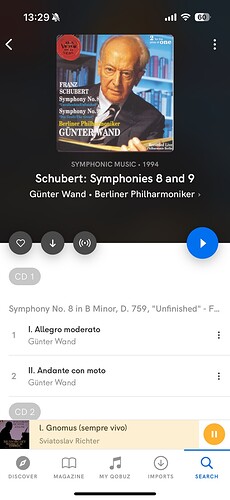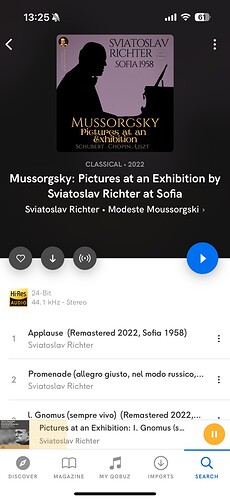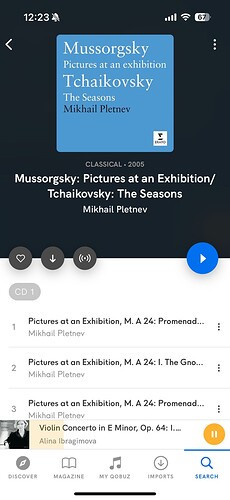Oops! Thanks Rudi, now fixed!
I’m playing catchup (though under strict orders not to rush or make this feel like work), but wanted to note some very basic thoughts on 91-95.
95 (Mozart Symphony No. 39 in E-flat Major, K. 543) Liked both of these, but considerably more so the Mackerras.
94 (Wagner Die Meistersinger von Nürnberg, WWV 96) Meh. Maybe it’s the length. Maybe that I’m seldom one for lyrics, and this one felt like a proper tome. In German. I’ll keep trying, but the operas and oratorios have been the least palatable for me so far.
93 (Palestrina: Missa Papae Marcelli & Missa Brevis) A big surprise. I thrashed this. Over and over. More of this type of piece one day please. When I’ve done all my homework ![]()
92 (Mozart, Requiem in D Minor, K. 626) Enjoyed both versions of this, but the John Butt romped in as my favourite. Liked this a lot. I know two from two (this and the Mackerras) does not a pattern or rule make, but the period versions seem to be more my taste. So far. (Who’d have thought I’d have opinions on this?! No matter how uninformed!)
91 (Mozart, Piano Concerto No. 24 in C Minor, K. 491) Really liked this. Especially at volume. Just lovely. No. 22 too. (Was a racehorse. Sorry ;-)) First time I’ve realised the sort of volume I should play some of these at.
And thank you once more, @struts001 — I can make out a tunnel now. And a glimmer of classical light peeping out. Previously there was a whomping great hill of impenetrable blerghhhh.
I needed palate cleansers for my time with 96–100, but this recent group was something I relished working through. I might even — shock horror — have looked forward to some of these sessions.
I now need to work on more useful ways to describe my thoughts. A barrage of “nice”, “enjoyed this” and “meh” doesn’t make for the world’s most interesting conversation ![]()
Week 7 Nos. 66-70
66. Also sprach Zarathustra (Thus Spoke Zarathustra), Op. 30
523 Richard Strauss Symphonic Poem 1896 Play
Also Sprach was the first piece recorded by the RCA team after taking over the contract for the Chicago SO under Fritz Reiner from Mercury in 1954. The “Living Stereo” series arguably contains some of the best analog orchestral recordings ever produced and this is no exception, certainly among my father’s most played records. The digital remastering brings out the quality of the original recording and offers absolutely reference quality sound, although it’s unfortunately not available in hi res on Qobuz.
So how to choose between this and Karajan’s 1973 recording which is, as Gramophone described it “an unmovable classic” and “a seamless meeting of minds between composer and conductor”?
Chicago SO, Reiner “Strauss: Also Sprach Zarathustra & Ein Heldenleben” 1954, 16/44.1
Berliner Philharmoniker, Karajan “Strauss: Also Sprach Zarathustra, Till Eulenspiegel” 1974, 24/96
67. Sonatas and Partitas for Solo Violin, BWV 1001–1006
35 Johann Sebastian Bach String solo 1720 Play
Some of the most frequently recorded violin music in the catalogue means we’re spoiled for choice here. One of the classic recordings, and the one I was brought up on is Itzhak Perlman’s EMI set from 1988, beautiful tone and really joyous playing.
However these pieces have been recorded by pretty much every violinist of note which means there is also a great selection of more recent recordings. Take your pick folks, Isabelle Faust, Amandine Beyer or Viktoria Mullova, there are only winners here! I lean towards Faust but IMO all of these are superb performances. What do you say @urbanluthier?
Perlman “Bach: Complete Sonatas & Partitas” 1988, 16/44.1
Faust “Bach: Complete Sonatas & Partitas (Vols 1 & 2)” 2010, 24/96
Beyer “Bach: Complete Sonatas & Partitas” 2011, 24/44.1
Mullova “Bach: Complete Sonatas & Partitas” 2009, 16/44.1
430 Claude Debussy Piano Sonata 1913 Play
The “classic” performance of the Préludes is the 1953-54 series by Walter Giesking (mono), here beautifully remastered in hi res digital by Warner Classics. As Bryce Morrison wrote in Gramophone “These records should be in every musician’s library, be they singer or conductor, violinist or pianist, etc. If Gramophone believed in a starring system they would deserve a heavenful of stars.”
Giesking “Debussy: Complete Piano Works” 1953, 24/192
412 Edvard Grieg Piano Concerto 1868 Play
The clear favourite here for many years was Leif Ove Andsnes. The Grieg was his first concerto recording when he emerged onto the scene in 1990 although it is his 2002 recording with the BPO under Mariss Jansons (which won a Gramophone award in 2004) which was for many years regarded as the benchmark. This has however subsequently (2010) been surpassed by another Norwegian, Sigurd Slåttebrekk accompanied by the Oslo Philharmonic under Michail Jurowski. Very moving stuff.
Andsnes, BPO, Janssons “Grieg, Schumann: Paino Concertos” 2002, 16/44.1
Slåttebrekk, Oslo Philharmonic Orchestra, Jurowski “Edvard Grieg: Chasing the Butterfly” 2010, 16/44.1
70. Symphony No. 7 in A Major, Op. 92
1299 Ludwig van Beethoven Symphony 1812 Play
While my father’s standard was Carlos Kleiber famous coupling of the 5th and the 7th leading the VPO I prefer Abbado and in particular his 1999 recording with the BPO to his 1987 outing with the VPO. However, given your interest in period performance I thought you might like the fantastic version by John Eliot Gardiner and the Orchestre Révolutionnaire et Romantique. @all2ofme I’ll be interested to hear what you think!
BPO, Abbado “Beethoven Symphonies Nos.7 & 8” 1999, 16/44.1
Orchestre Révolutionnaire et Romantique, Gardiner “Beethoven: Symphony No.7 op.92 & Symphony No.8 op…93” 1994, 16/44.1
Week 8 Nos. 61-65
728 Frédéric Chopin Piano Sonata 1839 Play
This is beautiful music, a cycle of 24 short pieces moving through all 24 key signatures, alternating each major with its relative minor, taking the listener on a journey of discovery and emotion. My go-to recording is one of my favourite pianists, Martha Argerich. Her virtuosity is on full display in this landmark set from 1975, although some critics contend she doesn’t plumb the full emotional extents of the contrasts in the work. For a more recent recording try this fantastic set from Ingrid Fliter (another Argentinian), technically on a par with Argerich but bringing completely different insights. The Linn recording is excellent as one would expect.
Argerich “Chopin: 24 Préludes, Piano Sonata No.2” 1977, 24/192
Fliter “Chopin: Préludes” 2014, 24/96
668 George Frideric Handel Unsorted Orchestral 1717 Play
Trevor Pinnock’s recording with the English Concert is the version by which all others have come to be judged and has to be the first recommendation. For an alternative take try the Gramophone Editor’s Choice recording by The Göttingen Festival Orchestra under Lawrence Cummings. Really taut, alert, vibrant playing.
The English Concert, Pinnock “Handel: Water Music Suites 1-3” 1983, 16/44.1
FestspielOrchester Göttingen, Cummings “Handel: Water Music” 2017, 16/44.1
63. Violin Concerto in D Major, Op. 77
681 Johannes Brahms Violin Concerto 1878 Play
Again, a very popular piece and more choice here than you can shake a stick at. I will go with Joshua Bell’s 1996 recording with the Cleveland Orchestra under Christoph von Dohnányi as my primary recommendation. One of our generation’s finest violinists at his brilliant best. For a historical reference you might like to compare with Nathan Milstein’s classic 1954 mono set. Both available in hi res digital.
Bell, Cleveland Orchestra, von Dohnányi “For the Love of Brahms” 2016, 24/96
Milstein, Piitsburgh SO, Steinberg “Brahms: Violin Concerto” 1954, 24/96
64. Piano Quintet in A Major (Trout Quintet), D. 667
406 Franz Schubert Piano Quintet 1819 Play
I have never strayed far from the Penguin Guide’s longstanding reference of this recording by András Schiff with the Hagen Quartet augmented by Alois Posch. This is another one of those recordings that is etched so deeply into my soul that other performances just sound “wrong” to me. Lovely music played with masterful joy.
Hagen Quartet, Posch, Schiff “Schubert: Trout Quintet; 6 Moments musicaux” 1999, 16/44.1
65. String Quartet No. 13 in B-flat Major, Op. 130
15 Ludwig van Beethoven String Quartet 1825 Play
Another Penguin Guide favourite that just sounds so “right” it doesn’t exactly have one scurrying off to find alternatives. Will be interested to hear if any of our classical aficionados (paging @bauer, @PAR) have any more recent recommendations here.
The Lindsays “Beethoven: String Quartets Op.130 & Op.133” 2001, 16/44.1
Still enjoying myself ![]()
90 (Mozart, Piano concerto 21 in C Maj) As you predicted, the Chardonnay went down easily. I can imagine this wearing a bit thin eventually, but for now it’s really pleasant.
89 (Mozart, Die Zauberflöte) I read the synopsis, I promise! Try as I might, though, 150mins of story seldom holds me as a film, and this one being sung only hindered my chances with it. (I very rarely pay attention to lyrics in shorter bits of music either.) I likely need to see something live and properly study the story/text beforehand to have more success with things like this. I note @PAR’s advice to follow along, and really, really tried. Will keep it up.
88 (Rimsky-Korsakov, Scheherazade) Yep! Lovely. And what a recording! Is the Stravinsky at the end a normal pairing? Wasn’t sure whether those were part of the recommendation. Less keen on those. Bit frenetic. The sort of thing that drives Meg to another room. Or to suddenly decide to run errands in town ![]() (“The Emperor’s Sickroom” sounded incredible though.)
(“The Emperor’s Sickroom” sounded incredible though.)
87 (Georges Bizet, Carmen) Not for me. Ok in places, but felt indulgent and ponderous. Oddly, the version I found with the matching cover was just extracts. Perhaps I’ve short-changed this one by not going the whole hog, but since I didn’t gel with the trailer maybe I shouldn’t attempt the entire enchilada. One bit I almost got into (third track, which on the version I tried was “L’amour est enfant de bohème”) had all sorts of nasty errors in the file. Gaps, crunches etc. Must tell Qobuz.
86 (Verdi, La traviata) Much preferred this to the Carmen. While it didn’t hold my attention too tightly I spent a very enjoyable evening reading as it pulsated away in the background. Can imagine a couple more listens might help it bed in a bit more.
Good stuff Ben! If you’re like most people this stuff will fall into three categories:
- You’ll like it
- You won’t like it at first but it will grow on you
- You’ll never like it
For the first 30-odd years of my classical journey about 30% fell in the last category and about 65% in the second. Just sayin’…
No, the Stravinsky is not a common coupling for Schéhérazade, in fact it isn’t a super common piece at all.
Week 9 Nos. 56-60
56. Requiem in D Minor, Op. 48
471 Gabriel Fauré Mass / Requiem 1890 Play
Going with my longtime favourite here The Corydon Singers and the ECO led by Matthew Best nicely captured by Hyperion in a very appropriate church acoustic. Check out In Paradisum Ben, “ethereally beautiful” as the Penguin Guide put it and I couldn’t agree more!
Corydon Singers, English Chamber Orchestra, Best “Fauré: Requiem; Antique de Jean Racine; Messe basse; 2 Motets, Op.65” 1989, 16/44.1
405 Giacomo Puccini Opera 1904 Play
Many great interpretations to choose from so picking a “best” is impossible and this one very much boils down to preference and familiarity. My go-to recording here is Karajan’s 1974 set with Mirella Frieni as Butterfly and Luciano Pavarotti as Pinkerton. Both up there with the very best of them individually and a complete knock-out together. However Ben, I am guessing you may prefer to spend some quality time with the new woman in your life and opt for Antonio Pappano’s reading with Angela Gheorghiu as Butterfly, although Jonas Kaufmann as Pinkerton is a matter of taste.
Frieni, Pavarotti, Wiener Philharmoniker, Karajan “Puccini: Madama Butterfly” 1974, 16/44.1
Gheorghiu, Kaufmann, Orchestra e Coro dell’accademia Nazionale di Santa Cecilia, Pappano “Puccini: Madama Butterfly” 2000, 16/44.1
58. String Quartet No. 14 in D Minor (Death and the Maiden), D. 810
524 Franz Schubert String Quartet 1824 Play
Again, a very crowded field here. I will always have an attachment to the Quartetto Italiano (it was a frequently played favourite of my housemaster’s) but my own vote goes with the Takács Quartet’s later (2006) recording on Hyperion.
Quartetto Italiano “Schubert: String Quartets Nos.13 & 14 ‘Death and the Maiden’” 1980, 16/44.1
Takács Quartet “Schubert: Death and the Maiden” 2006, 16/44.1
59. Piano Concerto No. 2 in C Minor, Op. 18
1135 Sergei Rachmaninoff Piano Concerto 1901 Play
As one of the cornerstones of the piano œuvre there are more Rach 2s than one can shake a stick at. How to choose? Well, a couple of safe bets are Sviatoslav Richter’s 1959 reading with the Warsaw Philharmonic under Stanislav Wislocki and Van Cliburn’s 1962 recording accompanied by the Chicago SO under Reiner. Both mono and both superbly remastered in hi res digital.
Richter, Warsaw Philharmonic, Wislocki “Rachmaninoff: Piano Concerto No.2; Préludes” 1960, 24/96
Van Cliburn, Chicago SO, Reiner “Rachmaninoff: Piano Concerto No.2 (Mono Version)” 1963, 24/96
797 Claude Debussy Unsorted Orchestral 1905 Play
Again, too many versions to count and many good ones (this week has been difficult!) I’ll land on two. Firstly the ever dependable Berliner Philharmoniker under Herbert von Karajan (their 1965 set) and secondly The Hallé Orchestra under Mark Elder. Take your pick.
Berliner Philharmoniker, Karajan “Ravel: Bolero; Debussy: La Mer; Mussorgsky: Pictures at an Exhibition” 2007, 24/96
Hallé Orchestrta, Elder “Debussy: La Mer; Préludes” 2007, 16/44.1
Week 10 Nos. 51-55
Half way already. This has been great fun, and some of the best stuff is still to come!
51. Missa Solemnis in D Major, Op. 123
21 Ludwig van Beethoven Mass / Requiem 1823 Play
Beethoven’s scoring calls for a large orchestra, however period instrument groups with their more starkly delineated sound definitely have an advantage in clarity with a piece as complex as this (and I know it’s your preference anyway, Ben). So in this case I’m going with Gardiner’s first recording with the ORR on Arkiv. I have listened to his more recent outing with the same forces recorded live at the Barbican and subsequently released on SDG and while it is no doubt dramatic I feel it loses some of the sense of reverence of the piece.
Monteverdi Choir, Orchestre Révolutionnaire et Romantique, Eliot Gardiner “Beethoven: Missa Solemnis” 1990, 16/44.1
51 Giuseppe Verdi Mass / Requiem 1874 Play
Abbado’s live performance with the BPO is an easy choice here, firstly because it stars your favourite diva but mostly because it is just a flat-out excellent performance. Full marks to the Swedish Radio Chorus who sing beautifully. One need look no further IMO even if Gardiner’s reading with the ORR offers an excellent period alternative here as well.
Gheorghiu, Barcellona, Alagna, Konstantinov, Swedish Radio Chorus, BPO, Abbado “Verdi: Requiem) 2001, 16/44.1
53. Piano Sonata No. 14 in C-sharp Minor (Moonlight Sonata), Op. 27
994 Ludwig van Beethoven Piano Sonata 1801 Play
Another one here which I think you’ll like, Ben. Beethoven’s beautiful, meditative and instantly recognisable “Moonlight” Sonata. I’ll go with two classic performances here. Rubinstein is my default, frequently in heavy rotation during my childhood. However don’t overlook Kovacevich, played with enormous sensitivity (even if the SQ is not EMI’s finest). I’ll be fascinated to hear if our resident classical experts can provide any recommendations of great performances by the current generation of pianists.
Rubinstein “Beethoven: Piano Sonatas” (2001 remaster) 1962, 16/44.1
Kovacevich “Beethoven: The Complete Piano Sonatas; Bagatelles” 1999, 16/44.1
868 Gustav Mahler Symphony 1902 Play
My first choice would probably be Abbado’s 1993 account with the BPO recorded during a live concert at the Philharmonie. This is Abbado at his best, the tone he coaxes from the Berlin strings is absolutely ravishing. However a nod also goes to Sir John Barbirolli’s classic 1969 analog recording made in Watford Town Hall(!), superbly remastered in hi res digital.
BPO, Abbado “Mahler: Symphony No.5” 1993, 24/44.1
New Philharmonia Orchestra, Barbirolli “Mahler Symphony No.5” 1969, 24/192
55. Symphony No. 2 in D Major, Op. 43
37 Jean Sibelius Symphony 1902 Play
This one is extra-special. Taken from a BBC concert in December 1954 in honour of Sibelius’s 89th birthday which was relayed live to Finland where the composer himself was guest of honour, Beecham and the BBC SO really rise to the occasion. This is live music making at its most electric, I actually find the audience noise (there was definitely a bad cold going round at the time) heightens rather than detracts from the experience.
No real need for alternatives (although there are plenty of good ones, not least Karajan) but if you want a recording with modern digital sound I can’t resist casting another patriotic vote for the beautiful reading by the Gothenburg SO under Santtu-Matias Rouvali.
BBC SO, Beecham “Sibelius: Symphony No.2” 1954, 16/44.1
Rouvali, Gothenburg SO “Sibelius: Symphonies No.2; King Christian II” 2020, 24/96
Week 11 Nos. 46-50
1586 Pyotr Ilyich Tchaikovsky Ballet 1876 Play
Choose here between Bonynge who brings out the dance aspects and Jurowski’s more symphonic take. Both great.
National Philharmonic Orchestra, Bonynge “Tchaikovsky: Swan Lake” 2002, 16/44.1
State Academic Symphony Orchestra of Russia, Jurowski “Tchaikovsky: Swan Lake” 2018, 24/96
47. Piano Concerto No. 1 in B-flat Minor, Op. 23
954 Pyotr Ilyich Tchaikovsky Piano Concerto 1875 Play
Need look no further than Pletnev’s high voltage account.
Pletnev, Philharmonia Orchestra, Fedoseyev “Tchaikovsky: Piano Concertos 1-3” 1998, 16/44.1
48. Piano Sonata No. 21 in B-flat Major, D. 960
20 Franz Schubert Piano Sonata 1828 Play
Kovacevich’s interpretations (his 1986 Hyperion and 1994 EMI) are the yardsticks here for many. I lean towards the latter.
Stephen Kovacevich “Schubert: Piano Sonata No.21 in B flat major D.960” 1986, 16/44.1
Stephen Kovacevich “Schubert: Piano Sonata No.21 in B flat” 2004, 16/44.1
49. Till Eulenspiegels lustige Streiche (Till Eulenspiegel’s Merry Pranks), Op. 28
5 Richard Strauss Symphonic Poem 1895 Play
Not a piece my father played too often, but when he did it was this classic 1959 recording of the Cleveland Orchestra under George Szell.
Cleveland Orchestra, Szell “Strauss: Don Juan; Till Eulenspiegels lustige Streiche; Tod und Verklärung” 1985, 16/44.1
50. Symphony No. 8 in B Minor (Unfinished Symphony), D. 759
51 Franz Schubert Symphony 1822 Play
I’’l go with Norrington’s recording with the London Classical Players, a beautiful poignant reading of a very poignant piece. However for a bit more drama and angst a patriotic vote for Thomas Dausgaard’s version with the Swedish Chamber Orchestra. Great sound.
London Classical Players, Norrington “Schubert: Symphonies Nos.4, 5, 6 & 8” 2005, 16/44.1
Swedish Chamber Orchestra Dausgaard “Schubert: Symphonies 8 & 9” 2010, 24/44.1
As always, @struts001 — thank you ![]()
Such a fantastic resource. Pining for my system again. Home in two days! So much fun ahead of me.
Week 12 Nos. 41-45
41. Violin Concerto in D Major, Op. 61
583 Ludwig van Beethoven Violin Concerto 1806 Play
Starting with another one of my father’s favourites and one to which I have developed a huge emotional attachment. Alfredo Campoli is a virtuoso of the old school. Incredibly beautiful sensitive playing, discreetly but expertly accompanied by the RPO under Sir John Pritchard. Despite having heard this literally hundreds of times I will never tire of it, I’m amazed this performance never attracted more critical acclaim. For a completely different perspective look no further than Thomas Zehetmair. This is a great example of how modern and period performances of the same piece highlight totally different aspects of the music.
Campoli, Royal Philharmonic Orchestra, Pritchard “Great Violin Concertos” 2015, 16/44.1
Zehetmair, Orchestra of the 18th Century, Brüggen “Beethoven: Violin Concerto” 1998, 16/44.1
502 Giacomo Puccini Opera 1896 Play
My go-to here is the classic Penguin Guide favourite, Pappano’s reading with Leontina Vaduz as Mimì and Roberto Alagna as Rodolfo. However I know what you want Ben so I can’t overlook Riccardo Chailly’s recording with the incomparable Angela Gheorghiu as Mimì (although his tempi are a bit brisk for my taste). This is one of Gheorghiu’s signature roles. She sung it for her graduation, debuted with it at the Royal Opera House in 1992 during which she met her future husband Roberto Alagna, and they married in 1996 while performing it together at the Met.
Alagna, Vaduz, Philharmonia Orchestra, Pappano “Puccini: La bohème” 1996, 16/44.1
Alagna, Gheorghiu, La Scala Milan Verdi Choir & Orchestra, Chailly “Puccini: La bohème” 1999, 16/44.1
368 Franz Liszt Piano Sonata 1853 Play
For me Mikhail Pletnev sweeps the board here and I’ll go with his later recording which shows the same dazzling virtuosity as his first outing, made in his twenties, but even greater finesse and maturity.
Pletnev “Liszt: Piano Sonata in B minor; Après une lecture de Dante; Funérailles; Gnomenreigen” 1998, 16/44.1
44. Cello Concerto in B Minor, 104, B. 191
472 Antonín Dvořák Cello Concerto 1895 Play
Again, no contest here, I’ll go with the critics’ favourite, Rostropovich’s 1969 account with the BPO under Karajan, all pretty much at their height. The DG recording from the Jesus-Christus-Kirche is as good as anything they produced in that era.
Rostropovich, Berlin Philharmonic Orchester, Karajan “Dvořák: Cello Concerto; Tchaikovsky: Variations on a Rococo Theme” 2015, 24/96
45. The Four Seasons (Le Quattro Stagioni)
2860 Antonio Vivaldi Violin Concerto 1723 Play
Again, I default to the recording I was “raised on”, a beautiful reading by Sir Neville Marriner with the Academy of St. Martin-in-the-Fields accompanying Alan Loveday. I have to say that it is easy to tire of the Four Seasons, as overused as it is in films, commercials, call centers and elevators. It must be one of, if not the most recorded classical piece in the catalogue and there are hundreds of recordings, so it is hard to stand out and some artists resort to gimmickry in order to do so. But not here, this is as fresh, vibrant, but straightforward a reading as one could wish for. I am sure all the classical buffs here will have their own favourite recordings to recommend but I’ll leave it there!
Loveday, ASMF, Marriner “Vivaldi: The Four Seasons” 2013, 24/96
Then my hit rate in my 40s isn’t too bad then! Not a lot in the oh-gawd-make-it-stop category.
85 (Brahms, Symphony No. 3 in F Major, Op. 90) Particularly enjoyed the second half, and liked the changes of pace in the Allegro.
84 (Boris Godunov, Modest Mussorgsky Opera). The first opera that I’ve (mostly) sat through happily. Not sure what was going on, and some bits that sounded rather like a cacophonous railway crossing — I liked them too! — but I enjoyed this. Felt big and dark and foreboding. (My glass of Caol Ila helped, I suspect, but my first listen was driving between St. Louis and Chicago, and I promise no Scotch was harmed on the road. Mind you, a sign highlighting the “Illinois Basset Waddle” suggested I could have been drinking. I shit you not.)
83 (Beethoven, Piano Sonata No. 32 in C Minor, Op. 111) Lovely. Really enjoyed this. Would never have guessed parts 1 and 2 were from the same movement, though!
82 (Copland Appalachian Spring, with Eiji Oue and the Minnesota Orchestra) I’m so glad I eventually noticed that it was just Appalachian Spring listed here. I suffered through Fanfare for the Common Man hoping it would be over quickly, and when things segued into Appalachian Spring I was much happier. Not a standout, but not the tiresome, indulgent yawnfest that preceded it. (Apologies to fans of the opener.) Having realised it was Appalachian Spring only I then tried the Tilson Thomas version. Preferred the Eiji Oue take though, which felt less frilly.
81 (Strauss, Der Rosenkavalier (The Knight of the Rose), Op. 59) Liked Acts 2 and 3 much more than Act 1. Overall not three hours I’d choose to spend often however.
Right, feel like I’m picking up speed again. Thank you once more, @struts001 ![]()
Week 13 Nos. 36-40
36. Clarinet Quintet in A Major, K. 581
15 Wolfgang Amadeus Mozart Clarinet Quintet 1789 Play
I know you like period performances, Ben, so try Alan Hacker for size. Beautiful tone, I am guessing the Larghetto might be right up your street.
Hacker, Salomon String Quartet “Mozart: Clarinet Quintets on Original Instruments” 1984, 16/44.1
37. Prélude à l’après-midi d’un faune (Prelude to the Afternoon of a Faun), L. 86
549 Claude Debussy Symphonic Poem 1894 Play
Haven’t listened to this for a while so this was a real treat! This is really beautiful music. It turns out the Penguin rosetted recording by Serge Baudo with the LPO isn’t available on Qobuz (although it is, via the compilation “Figure Skating Classics”, on Tidal) so I’ll go with Dutoit leading the Orchestre Symphonique de Montréal. Not too shabby either, in fact I might even prefer it!
Snowden, London Philharmonic Orchestra, Baudo “Figure Skating Classics” 2016, 16/44.1
Orchestre Symphonique de Montréal, Dutoit “Debussy: La Mer; Jeux; Prélude à l’après-midi d’un faune; La Martyre de Saint Sébastien (Symphonic Fragments)” 1989, 16/44.1
38. Symphonie fantastique, H 48
626 Hector Berlioz Symphony 1830 Play
Only one choice for me here, the classic 1959 recording with Sir Thomas Beecham leading the Orchestre National de la RTF. Forget that it is mono, the sound is superb and this hi res remastering does it full justice.
Orchestre National de la Radiodiffusion-télevision Française, Beecham “Berlioz: Symphonie fantastique” 1959, 24/96
39. Clarinet Quintet in B Minor, Op. 115
373 Johannes Brahms Clarinet Quintet 1891
Again, this one is quite easy, but not for the usual reasons. I’ll go with Martin Fröst here. Firstly because his reading is absolutely beautiful, definitely up there with the best out there, but secondly, and more importantly, because our sons play on the same football team!
Fröst, Jansen, Brovtsyn, Rysanov, Théeden, Pöntinen “Brahms: Clarinet Quintet & Trio; 6 Songs” 2014, 24/44.1
31 Igor Stravinsky Ballet 1911 Play
I’ll side with Robert Layton here and go with the LSO under Abbado. A fantastically alert reading which does full justice to the “kaleidoscopic brilliance” of the score.
London Symphony Orchestra, Abbado “Stravinsky: Le Sacre du Printemps; The Firebird; Pétrouchka; Pulcinella; Jeu de cartes” 1997, 16/44.1
80 (Strauss, Ein heldenleben, Op 40) Another good one. Felt a bit like sitting down to listen to Star Wars. No bad thing ![]()
79 (Sibelius Finlandia, Op 26) Loved this. Mixture of dark and light, delicate and powerful. Really enjoyed this one ![]()
78 (Wagner: Parsifal, Bayreuth FO, Knappertsbusch WWV 111) One of the more successful operas so far for me. I’d much rather something shorter, but over two evenings this was good. (Preferred the first half, but no good reasons for why.)
77 (Mozart, String quartet no 4 in G Minor, K 516, Tamestit) Gorgeous. More please.
76 (Shostakovich Symphony No.5, Sanderling) Just wonderful. Really enjoyed the deep sense of foreboding, mixed with odd bouts of chirpiness.
Sounds like a pretty good week then, cool!
What an amazing thread. A lot to learn here.
Cool @Marq, feel free to dive in. I hope you get some value from it.
Just to be clear I don’t claim these recommendations to be in any way “definitive”. “People’s tastes, like their bottoms, are split down the middle” (as they say here in Sweden) so if you ask 5 people which is their favourite performance/recording of a certain work you’ll get at least 6 answers.
This is just my way of paying forward the appreciation and love of classical music that I inherited from my parents over the first half of my life. I was literally in my 30s before I started playing classical myself for my own enjoyment, and suddenly discovered that I had, by some sort of osmosis and completely subconsciously, acquired a mass of experience. I never had to take myself through the discovery phase with classical from a clean sheet because I was being spoon-fed a diet of it literally every day from birth. I hated it at the time, but slowly it grew on me.
Now one of the most common things I hear among non-classical listeners wanting to dip into classical is that it is overwhelming, “there’s just too much”, “where do I start?”. So it occurred to me that one approach would be to be very prescriptive, provide “swim lanes” to make the “pool” less intimidating. So I decided to pick an arbitrary list of representative works and then present my (in many cases my parents’) favourite recordings, many of which are in turn based on recommendations harvested from decades of reading the Penguin Guide to Records (latterly CDs) and Gramophone magazine. Thanks to the advent of streaming sites like Qobuz this becomes an almost trivially easy undertaking.
So there it is. I am still hoping some of our real classical buffs will chime in with their own favourites, but even if not I intend to see this through so it can serve as a resource for anyone that might find it helpful as long as the forum remains active. Happy listening!
I’m not a classical listener but I’d like to dip my toe in. A few years back I wasn’t a Jazz listener either but now I reckon it’s probably 75% of my listening. Always good to discover new things.
Week 14 Nos. 31-35
Great line up this week with two Mendelssohn works - what a treat!
31. Goldberg Variations, BWV 988
866 Johann Sebastian Bach Piano Sonata 1741 Play
Where else to start than Glenn Gould? The Canadian has become so synonymous with this work that some jokingly refer to it as the “Gouldberg” variations. The first of his two studio recordings for Columbia in 1955 completely redefined interpretation of the piece and provided his breakthrough into the mainstream. The tempi are breathtaking as are his insight and virtuosity. The critics went bananas. I will go with this over his later and far more measured 1981 recording (he claimed he had “discovered slow”) although many feel it is even more penetrating. They do make a really interesting comparison!
Gould “Bach: Goldberg Variations, BWV 988 (1955), Gould remastered” 1956, 24/44.1
Gould “Bach: Goldberg Variations, BWV 988 (1981), Gould remastered” 1982, 24/44.1
Although I had over a hundred recordings of the Goldbergs in my CD collection my personal favourite remains this little-known recording by Ekaterina Derzhavina. To me this is perfection. She is a virtuoso pianist but not a show off, the tempi are taut but not rushed, and she has beautiful balance between the two hands allowing the listener to follow the different lines at will.
Derzhavina “Bach: Goldberg Variations” 1994, 16/44.1
32. A Midsummer Night’s Dream Overture, Op. 21
22 Felix Mendelssohn Unsorted Orchestral 1826 Play
Here I have to go with André Previn coaxing an enchanting performance out of the LSO. No prizes for guessing that this is another hand-me-down from my father born of an Ivan March recommendation. The soloists too are excellent. For a modern digital recording try Iván Fischer and the BFO on Channel Classics.
London Symphony Orchestra, Previn “Mendelssohn: A Midsummer Night’s Dream, Op. 61” 1977, 16/44.1
Budapest Festival Orchestra, Fischer “Mendelssohn: Overture & Incidental Music to A Midsummer Night’s Dream” 2018, 24/192
33. Violin Concerto in E Minor, Op. 64
726 Felix Mendelssohn Violin Concerto 1844 Play
Ray Chen won the 2008 Menuhin Competition playing this piece (and then went on to win the 2009 Queen Elizabeth Competition in Brussels with the Tchaikovsky coupling) and it’s not hard to understand why. Fantastic playing beautifully accompanied by the Swedish Radio Symphony Orchestra under Daniel Harding.
Chen, Swedish Radio Symphony Orchestra, Harding “Tchaikovsky & Mendelssohn: Violin Concertos” 2012, 16/44.1
34. Symphony No. 9 in C Major (The Great C major), D. 944
443 Franz Schubert Symphony 1828 Play
Günter Wand all the way here. A live performance with the BPO from 1994 and he has them on their toes from start to finish, “mesmeric” as one critic put it. Outstanding SQ from the RCA engineers.
Berlin Philharmonic Orchestra, Wand “Schubert: Symphony Nos. 8 & 9” 1994, 16/44.1
729 Modest Mussorgsky Piano Sonata 1874 Play
Have to start with Sviatoslav Richter’s live recording from Sofia in 1958, described by one critic as “some of the most extraordinary piano playing you could hope to hear”. Poor SQ with lots of audience noise and a quite distant acoustic but a historical treasure nevertheless.
For a modern digital recording of an excellent performance I would recommend one of my favourite romantic pianists, certainly for Russian composers, Mikhail Pletnev.
Richter “Mussorgsky: Pictures at an Exhibition at Sofia” 2022, 24/44.1
Pletnev “Mussorgsky: Pictures at an Exhibition; Tchaikovsky: The Seasons” 2005, 16/44.1
